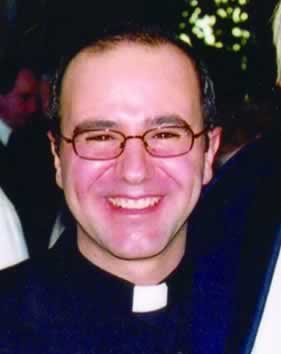Why Be a Missionary Priest
Coming to a joyful decision after a journey of discernment that includes study, community life, and pastoral experiences in Canada and overseas
By Ignacio Pinedo
January 2004
Return to Table of Contents
Print Article
When I learned that I was assigned to work at St. Dominic's parish in Mississauga this past summer, I nearly leaped for joy. This was something I had yearned for because I knew that the experience would help me in discerning my vocation.
You may ask why working in a Canadian parish would be so important for someone who wants to become a missionary priest. This is similar to another question I am often asked: "Why do you want to be a missionary priest when there is such a need for priests here in Canada?"

Ignacio Pinedo
The answer to these questions is not as simple as saying that, as the son of immigrants and an immigrant myself, and having lived in different countries of the world, I have developed a love for the many peoples and cultures that exist. Nor is it a matter of my ability with languages. Nor does it have to do with my love, or lack thereof, for Canada that would keep me from staying and working here as a parish priest.
I have had several pastoral experiences here that have given me a sense of the work I might be doing as a priest. I have worked in soup kitchens and drop-in centers, at homes for the aged, at a centre for young unwed mothers, with refugee families, and as a hospital chaplain. I have done pastoral work among the indigenous people of Ecuador. But I lacked an experience of working and living in a Canadian parish, alongside a pastor, and developing a close pastoral relationship with parishioners.
There is not a lot of difference between my training as a Scarboro missionary priest and the training of a diocesan priest. As a Scarboro priest candidate, I receive additional training to help me adjust to some of the cultural and linguistic differences of working in a foreign country, and I receive additional courses in the theology and history of mission.
The difference comes, I believe, when you look at the spirituality and the pastoral nature of a mission community. Living with a community such as Scarboro Missions and talking to the missioners who have worked overseas has given me a sense of their experience of mission, of what mission work is all about. They talk about the plight of the poor; the terrible conditions under which many people live; the unjust oppression exerted by the ruling powers, and so on.
And missioners talk about the power of the Gospel to change things, to break down barriers, to unite people, to redeem them and to heal them, no matter how terrible the socio-economic, cultural, and political conditions might be.
Working at St. Dominic's this past summer taught me what is required to be a good and loving pastor, and how to minister in both a challenging and compassionate way. I learned to recognize the presence of the Spirit in the midst of a congregation. There is a life in the pews that can be seen in the people's lived faith, in their understanding of the connection between faith and life. The Spirit is alive in their prayerfulness; in their joyful liturgies; in their understanding of the Sacraments as giving grace to the milestones in their lives; and in their active participation in the different ministries of the parish.
Most importantly, I learned what happens when a congregation heeds the call of the Lord to go and put out into the deep, to reach out to the least fortunate, to share our spiritual and material wealth with the least of our brothers and sisters. The parishioners become what I would call a socially-conscious Gospel community. What a great example for a future missionary priest who is called to walk among the poor.
I fell in love with this parish community, yet the experience only affirmed my decision to become a missionary priest. Among the parishioners at St. Dominic's, I met people from all parts of the world. These are the fortunate ones who have made it out of their countries and have come to Canada, to 'a land of plenty.' But what about those who did not make it, the ones who are still struggling and dying in poorer nations?
For me, being a missionary priest is about sharing your gifts with others. It is about living in those places of the world where the poor have no safety net, where great injustices are committed against the weakest in society. Being a missionary priest is about living in solidarity and love. It is about becoming one with those who have a special place in the heart of God-the poor, the widow, the orphan and the stranger.
And it is about trust. Yes, a missionary priest is someone who is willing to trust his life to God in places where he is "a stranger foraging in an unknown land." It is placing himself totally in the hands of God, while doing God's work in the world. What better life can a Christian hope to live?
Ignacio Pinedo is a priest candidate with Scarboro Missions. This January he was ordained to the diaconat and in May 2004 he will be ordained to the priesthood.
Return to Table of Contents
Print Article